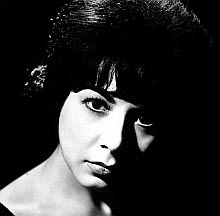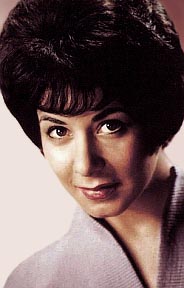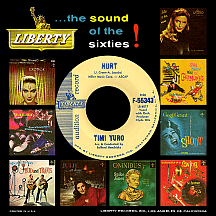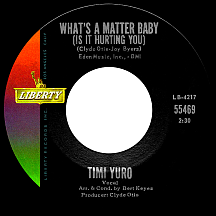TIMI YURO
Edith Yuro had confidence in her daughter's obvious talent from the beginning. Rosemary Timotea Yuro was constantly singing and her never-take-no-for-an-answer Italian mom arranged for young "Timi" to take voice lessons not long after she began elementary school on Chicago's West Side. When the family moved to Los Angeles in 1952, the 12-year-old began studying with the great Lillian Rosedale Goodman, an accomplished singer, songwriter, pianist and vocal coach. While attending Fairfax High, Timi sang with the school's a cappella choir and girls' glee club while working after school as a waitress; her grown-up vocal sound, an uncanny knack for phrasing and fearlessness in auditions led to a few weekend nightclub gigs at age 16, despite her five foot height and youthful appearance. Doors would continue to open for her quite easily.
Her parents opened a restaurant and while the Italian eatery struggled at first, business improved markedly after Timi began singing there regularly. Sonny Knight (the singer best known for his hit "Confidential"), moonlighting as a talent scout for Liberty Records, caught one of her performances in 1959 and recommended her to the label, though several months passed before company president Al Bennett decided to give her a shot. For some reason, Bennett had a hard time figuring out how to market the still-teenage vocalist. A certain amount of experimentation took place as she made demos in different styles; when asked about some of these early recordings, Timi called them "awful hillbilly things" and indicated she was happy they were never released.
In early 1961 she suggested "Hurt" (a Jimmie Crane-Al Jacobs song, it had been a hit for Roy Hamilton in 1954), but executives at the label just weren't feeling it. The timing was right for Clyde Otis, working independent of his regular job as head of A&R at Mercury Records, to help Timi land her first hit single while establishing himself with the company. He and arranger Belford Hendricks (the two had spearheaded many hits at Mercury for Brook Benton, Dinah Washington and others) brought out the best in the Fairfax grad with a result somewhat unique for the time, as she varied timbre (deep and mature, young and vulnerable) while adding spoken asides. "Hurt" hit the top ten in September 1961 and its flip side, "I Apologize" (a Billy Eckstine hit from '51), also received a considerable amount of airplay. On the strength of "Hurt" (and I'd venture to guess this song alone), she was nominated for a Best New Artist Grammy award early the following year.
Timi's emotional interpretations of these songs were a welcome departure from the strong male voices associated with the best-known previous versions; disc jockeys sometimes referred to her as "Miss Timi Yuro" so there would be no doubt she was female (Toni Fisher had endured a similar kind of nonsense, though in her case the gender-prefix remained). Frank Sinatra, for one, was taken with the young singer's accomplished sound and arranged for her (and only her) to open for him on his December tour of Sydney, Australia. Sticking with the initial formula, Liberty followed with "Smile," the 1936 Charlie Chaplin tune (from Modern Times) that had been a hit for Nat "King" Cole after lyrics were added in 1954. Timi composed the flip side, "She Really Loves You" (Otis, on the verge of accepting a permanent position at Liberty, also took writer credit), a song consistent with the tone of her better-known works.

Johnnie Ray (who recorded for Liberty a very short time) was teamed with Timi as a duet partner on "I Believe," another early-'50s song, this one from Frankie Laine's stable of hits. Neither it nor "Let Me Call You Sweetheart," a standard from 1910 by songwriting team Leo Friedman and Beth Slater Whitson (both of whom had died more than 30 years previous and thus missed out on Timi's hardy attempt at revitalizing their fossilized barbershop-era song) were failures in terms of sales or airplay. So what exactly were the Liberty bigwigs shooting for with this 21-year-old singer who clearly possessed a commanding vocal style? Were they purposely trying to make her old before her time or could there still be a chance, at this relatively early stage, that she might gain more relevance with a fan base nearer her own age? The answer came shortly.
Taking note of her quickly-diminshing momentum, Clyde Otis began matching the singer with more contemporary material, i.e. songs he'd written himself. "Count Everything" (penned with Hendricks), a half-baked swipe of Gloria Lynne's recent hit "Impossible," didn't quite hit the mark. Then there was "What's a Matter Baby (Is it Hurting You)" by Otis and Joy Byers (who wrote several songs for Elvis Presley, though her husband Bob Johnston, a longtime acquaintance of Clyde's, has claimed credit for many of Byers' compositions); Timi hit pay dirt, artistically and commercially, with this killer track, on which she delivered an assertive and soulful performance enhanced by a timely Bert Keyes arrangement. It peaked just shy of the top ten in the summer of '62.
A Burt Bacharach-Hal David song, "The Love of a Boy," arranged and conducted by Bacharach, reached the top 50 in January '63, simultaneous with Burt's decision to place his primary focus on the soon-to-be-booming career of Dionne Warwick. Had he continued working with Yuro, who can say what heights she might have reached? Clyde Otis left Liberty around this time and the baton was passed to Ed Silvers, who sent Timi down a country path, starting with Hank Cochran's "Make the World Go Away." Her rhythm and blues-type vocal with a pop-country backing followed the example set by Ray Charles with his massive Modern Sounds in Country and Western Music of the year before; Esther Phillips had been successful a few months earlier taking a similar tack with the country tune "Release Me." A summertime top 40 hit, Timi's "World" predated Ray Price's popular country version by several weeks. Then "Gotta Travel On" found her taking a slow-build vocal approach very much in contrast to Billy Grammer's hit rendition from '59.
Record sales had stalled by the following year and she left Liberty for a fresh start at Mercury Records, working with the likes of Quincy Jones. Her second single for the label returned her to Roy Hamilton territory; a remake of his fabulous '61 hit "You Can Have Her," penned by Bill Cook, was logically reconfigured as "You Can Have Him," a Nick Venet production arranged by Jack Nitzsche. This sharp studio team somehow delivered a lackluster result that seemed to indicate she was stuck in a previous mindset; it didn't help that a competing version by Warwick dampened airplay potential in the spring of '65.

In May 1966, Timi got engaged to singer Lou Christie (who'd recently topped the charts with "Lightnin' Strikes"); they had been friends for a few years, but the relationship escalated during a romantic rendezvous in London. He popped the question and the smitten couple set the date for her birthday, August 4, though by the time the three months passed, they had parted. During the remainder of her two years at Mercury, a swarm of seasoned music men came up short in their attempts to get her back on track. Seeking to establish an acting career, she traveled to the Philippines in 1967 and had small parts in an action film, Incognito, and a musical, Buhay Marino ("Marine Life"). The following year, Timi recorded Georges Delerue's theme for the British film Interlude, a well-received drama starring Oskar Werner. Her ethereal, emotional performance of the song (also known as "Time is Like a Dream") was featured on the Colgems soundtrack album, while a single (with a different take) was released on her former label, Liberty.
Timi's voice deepened as she made occasional attempts at reviving her career. Giving country music another try (I would have made a number of completely different suggestions), she recorded Michael Hazlewood's "Southern Lady" for Playboy Records in 1975; the same year she became a hot commodity in the Netherlands with a rerecording of "Hurt" that became a surprise hit. In later years she battled throat cancer and passed away in 2004 at age 63. Timi Yuro was a gifted singer who, despite having several memorable hit records, was underrated and, I believe, sold short by the powers that be at Liberty Records during an important phase of her development. A twist here, a turn there, and she might have been a much bigger star.
NOTABLE SINGLES:
- Hurt /
I Apologize - 1961 - Smile /
She Really Loves You - 1961 - I Believe - 1961
by Timi Yuro and Johnnie Ray - Let Me Call You Sweetheart - 1962
- What's a Matter Baby (Is it Hurting You) - 1962
- The Love of a Boy - 1962
- Insult to Injury - 1963
- Make the World Go Away - 1963
- Gotta Travel On - 1963
- Permanently Lonely - 1964
- I'm Movin' On - 1964
- You Can Have Him - 1965
- Once a Day - 1966
- Turn the World Around the Other Way - 1966
- Interlude - 1968
- Southern Lady - 1975



